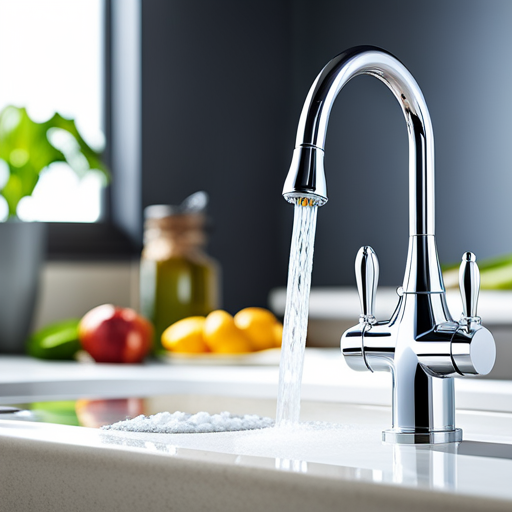Hard water is a common problem that affects a significant number of households around the world. It is characterized by a high mineral content, particularly calcium and magnesium, that can cause a range of issues such as scale buildup, reduced water pressure, and clogged pipes. These problems can affect not only the performance of your appliances and plumbing but also your skin and hair.
In this article, we will explore 10 common problems associated with hard water and their impact on your daily life. We will also discuss the solutions available to help you address this issue and avoid long-term damage and expenses.
Whether you’re dealing with dirty dishes, dry skin, or increased energy bills, understanding the challenges of hard water and how to mitigate its effects can make a significant difference in your quality of life. So read on to learn more about hard water woes and what you can do about them.
Key Takeaways
– Hard water can lead to scale buildup on appliances and fixtures, reduced lifespan of appliances, and dirty and spotted dishes.
– The excess use of detergents and soaps can lead to soap scum, and irritated dry skin and hair.
– Water softeners and testing water hardness can be solutions for hard water.
– Hard water can lead to damage to appliances and plumbing systems, difficulty cleaning surfaces and appliances, and affects taste and quality of drinking water.
Common Hard Water Issues
The common hard water issues include a variety of problems that can affect both household appliances and personal hygiene. Scale buildup on appliances and fixtures is a common issue, as the high mineral content in hard water leads to deposits that can clog pipes and reduce water pressure. This can cause appliances such as water heaters and washing machines to fail prematurely, reducing their lifespan and efficiency.
Additionally, hard water can lead to dirty and spotted dishes, as well as difficult cleaning due to scale deposits. Excess use of detergents and soaps is often necessary to create suds and remove stains, which can lead to soap scum buildup and increased water bills.
To address these common hard water issues, cleaning methods may be required to remove mineral deposits from appliances and fixtures. Additionally, water testing options can help determine the level of hardness in the water and provide insight into the best treatment options. Water softeners are a common solution for hard water, as they remove minerals such as calcium and magnesium from the water supply.
By addressing common hard water issues, households can avoid long-term damage and expenses related to appliance and plumbing repairs, as well as improve the quality of their drinking water and personal hygiene.
Solutions for Hard Water
One solution for dealing with the negative effects caused by high mineral content in water is to install a water softener system. Water softeners work by removing the calcium and magnesium ions that cause hardness in water through a process called ion exchange. This results in numerous benefits for homeowners, including better lathering of soaps and shampoos, reduced soap scum buildup on surfaces and appliances, and cleaner, spot-free dishes and laundry.
Water softener benefits extend beyond just better cleaning results. By removing hard water minerals, softeners also help extend the lifespan and efficiency of appliances and plumbing systems, reduce energy bills, and prevent the buildup of limescale in pipes and appliances.
While professional installation is typically recommended for water softeners, there are also DIY hard water solutions available, such as magnetic water softeners and salt-free systems. It’s important to research and carefully consider the different options available to determine the best solution for your specific hard water problems.
Impact of Hard Water on Appliances and Health
Installing a water softener system can significantly improve the efficiency and lifespan of appliances and plumbing systems, while also reducing the risk of limescale buildup and subsequent damage.
Hard water contains high levels of minerals such as calcium and magnesium, which can accumulate in pipes and appliances over time, reducing water pressure and causing damage to these systems. This buildup can also reduce the efficiency of appliances, leading to higher energy bills and the need for frequent repairs and replacements.
In addition to damaging appliances and plumbing systems, hard water can also cause skin irritation. The minerals in hard water can make it difficult to lather soap and shampoo, resulting in dry and irritated skin and hair. This can be particularly problematic for people with sensitive skin or those who suffer from skin conditions such as eczema.
By installing a water softener system, individuals can reduce the risk of skin irritation and improve the overall quality of their water.
Conclusion
In conclusion, hard water can have a significant impact on both your daily life and the longevity of your appliances. The high mineral content in hard water can cause scale buildup, clogged pipes, and reduced water pressure, among other issues. These problems can lead to increased energy bills and costly repairs. Fortunately, there are solutions available to combat hard water, such as water softeners and descalers. These options can help prevent long-term damage and expenses. It’s essential to address hard water issues promptly to avoid further complications and maintain a healthy and comfortable living environment.
Furthermore, hard water can also affect your skin and hair, causing dryness, irritation, and even premature aging. It’s crucial to be aware of the potential negative impact of hard water on your health and take the necessary precautions to protect yourself.
Overall, understanding the common problems associated with hard water and the solutions available can help you maintain a healthy and comfortable living environment, prolong the life of your appliances, and avoid unnecessary expenses.
